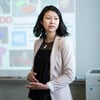Harbord Collegiate Institute student Imogen Bysshe reflects on her learning from Radiozilla, a student-led radio broadcast project with Facing History and Ourselves and Regent Park Focus.
My Grade 11 year was largely highlighted by my experience in the Toronto District School Board (TDSB) and Facing History and Ourselves “Genocide and Crimes Against Humanities” course. Through it, my class and I were able to explore topics that sometimes rendered us speechless and often produced new inspiration in our minds. Every day in class we would learn about atrocious events of the past or present, at home or abroad. We would try to step into the shoes of the victims and the perpetrators, and understand the atmosphere around such events. However, throughout the course we always knew that what we were studying was too far removed from our lives for us to be helpful. If they were current issues, we struggled to find a way that we, Torontonian high school students, could tackle such issues. It was often very distressing to delve into difficult questions when none of us could really provide an answer.
When Facing History and Ourselves and Regent Park Focus teamed up for the Radiozilla project, it seemed they had found a very real way for us to step up and start challenging this obstacle. Through creating our very own radio program, we were not only able to learn from each other and start answering our big questions, but we were also able to share what we learned with our community. In small groups of students, brought together from all over the TDSB, we chose topics that we were drawn to and wanted to further investigate. While putting together our radio show, we were able to talk to experts (a social psychologist, for example and Holocaust survivor) and have conversations with the public as well as our peers, while also learning what happens behind the scenes at a radio studio. Media can be a wonderful thing - it allows for the flow of constant and diverse communication, a much-needed tool if you’re seeking to create change.

What I learned from this project was that although at this time in my life I may not be able to make physical change in the world, there is a whole different side of revolution meant for young and inspired students like me. It is through spreading our ideas, concerns, and discussions within our communities that a real difference can be made. Meaningful conversations are a stepping-stone into a place where visions of the future are more foreseeable. You just need to get those conversations broadcasted!
To learn more about our project results, please check out our radio documentaries here.
Imogen Bysshe is a Facing History and Ourselves student at the Harbord Collegiate Institute in Toronto and a 2014 Radiozilla youth participant. Radiozilla was produced with the generous support of the Ontario Trillium Foundation and the Mozilla Foundation. This essay originally appeared on the Regent Park Focus blog.


Find resources and ideas for digital storytelling projects on our sister blog InterFacing. Edtech blogger Kathy Schrock also has great tools for starting digital storytelling projects with young people on her blog Kathy Schrock’s Guide to Everything.
Are you using audio, visual, and multimedia storytelling with your students? Tell us about it with a comment below!

